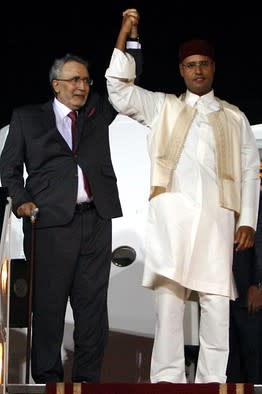 The Envoy
The EnvoySchumer: Halt funds to Libya until Lockerbie bomber jailed

Sen. Charles Schumer, the influential New York Democrat, is calling on the State Department to suspend aid to Libya's new Western-backed rebel government unless it agrees to re-imprison the Libyan man convicted for his role in the 1988 bombing of Pan Am flight 103 over Lockerbie, Scotland.
"If the new Libyan government continues to shield this convicted terrorist from justice, then they should not get one more cent of support from the United States," Schumer said in press release Wednesday. The release was timed to accompany a separate letter from Schumer to Secretary of State Hillary Clinton spelling out his demands.
"We put American lives and money on the line to help the Libyan people secure their freedom," Schumer continued. "It's time the Libyan government lives up to its commitment to create a free and accountable society by handing over al-Megrahi so that justice can finally be done."
Abdelbaset al-Megrahi, a former Libyan intelligence official from a prominent Libyan tribe, was convicted and sentenced to life in prison in 2001 for his role in the Lockerbie bombing, which killed 259 passengers, many from New York and New Jersey, and 11 people on the ground. But two years ago, a Scottish prison board released Megrahi, having determined he was suffering from terminal cancer and had only three months to live. When Megrahi flew back to Libya in August 2009, he was given a hero's welcome and greeted personally by Gadhafi's son Seif al-Islam. The incident was, as intended, deeply humiliating to American and British officials.
And as Megrahi has gone on to long outlive his three-month diagnosis, questions about his suspicious release have caused unusual friction in normally placid American-British relations. Last year, American lawmakers pressed for an investigation into the role that British business interests may have played in Megrahi's release. (One key target of inquiry was troubled oil giant BP, which was negotiating for energy exploration rights in Libya around the time of Megrahi's release.) The British government has strongly denied such insinuations, pointing out the independence of Scotland's judiciary, and the investigations have gone nowhere.
So far, at least, the fall of Gadhafi's government doesn't promise to clear up any of the confusion surrounding the case. A representative of Libya's opposition National Transition Council (NTC) told journalists Sunday the rebels would not extradite Megrahi. The NTC then reportedly backtracked, after the State Department said Monday that it has asked the NTC to review the Megrahi case.
Meanwhile, CNN's Nic Robertson visited Megrahi at his Tripoli villa Sunday and found him at least appearing to be unconsciousness, on an IV drip, cared for by his mother. Shortly thereafter, journalists uncovered a 2009 letter from Megrahi to Abdullah Senussi, Libya's erstwhile intelligence minister, professing innocence in the Lockerbie plot as they sifted through Senussi's abandoned offices.
In the letter, "Mr. Megrahi blamed his conviction on 'fraudulent information that was relayed to investigators by Libyan collaborators,'" the Wall Street Journal's Charles Levinson, Margaret Coker, and Alistair McDonald reported Tuesday. Megrahi blamed his conviction on "immoral British and American investigators" who "knew there was foul play and irregularities in the investigation of the 1980s."
Libya analysts have suggested the NTC may be cautious about Megrahi due to its pursuit of fledgling political alliances: Megrahi is from an influential Libyan tribe, the Magarha, that is being courted by the rebels as it had been previously by the Gadhafi regime.
Given the competing demands at play, Schumer pressed Clinton to employ one key bit of leverage the United States has with the Libyan rebels: money. In particular, Schumer urged the secretary of state to make strategic use of the billions of dollars in Libyan regime assets now frozen in U.S. bank accounts. Last week, the UN sanctions committee agreed to unfreeze the first tranche of those funds: some $1.5 billion in U.S.-held Libyan regime assets that the new government can use to pay salaries, fuel bills, and for UN humanitarian aid programs in the country.
Washington Libya watchers say U.S. diplomacy on the matter needs to be sensitive to the domestic political demands of all the parties involved--including the brand-new Libyan rebel-democrats, as well as the U.S. lawmakers representing the families of some of the 259 passengers killed on the downed flight.
"If we choose to seek [Megrahi's] extradition, even better," said Joel Rubin, a former State Department Egypt and Libya desk officer and former Senate staffer who now heads government relations for the Ploughshares Fund, in an email to The Envoy Tuesday. "But we need to think about doing this in a manner that understands that the [NTC] is attempting to create a new Libya -- and is not the one that murdered and terrorized both Americans and Libyans ... Now that we have the chance for a new relationship, we should make our concerns both clear and in a manner that reflects these new and improved circumstances."
Secretary of State Clinton will surely be putting such a positive spin on the situation when she arrives in Paris for a meeting Thursday of the international Contact Group on Libya, the international coalition that has coordinated the intervention to date there. Meanwhile, a Justice Department spokesman told The Envoy Wednesday: "The investigation into the bombing of Pan Am flight 103 remains open. We remain committed to pursuing justice on behalf of the victims of this tragedy."
